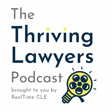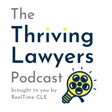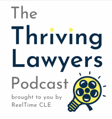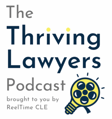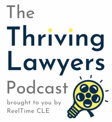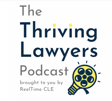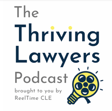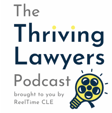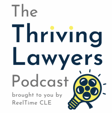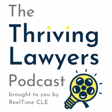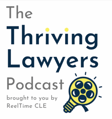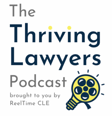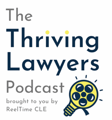Integrating AI into Microsoft Office
00:00:00
Speaker
Wow. That's going to be super cool. Yeah, well, I just read something that was posted that said that Microsoft is like, hey, look, we're going to figure this out and we're going to embed this chat GPT type AI learning, some kind of aspect of it in Word, Excel, and...
00:00:20
Speaker
Oh, yeah. Outlook. I mean, you know, it's going to happen. And that sort of gets me to, you know, something that I've been thinking about a lot. So my background,
Journey from Law to Education
00:00:30
Speaker
I practiced law for a while, discovered the educational thing that I told you about earlier that made me
00:00:36
Speaker
get more excited and realize, ooh, I like creating things that people actually want to come to and enjoy. And I like, especially, they come into CLE with very low expectations. And I'm like, well, I can meet those and exceed them. In fact, low hanging fruit, it's not gonna suck. Watch this. We're gonna have fun.
00:00:51
Speaker
We're exactly. And we did and we have. And then I actually got to teach law school for a few years while we had one here in Charlotte. And then it was not well managed. That's a whole long story. But I got back into practice. So I still do teaching and training, kind of moving that direction. But and that's part of what the book is, which you've been so kind as to say that you would actually we talked around and a lot of what you've talked about is
00:01:15
Speaker
relevant on that subject because a thing that's fascinated me and what's what I've worked on even though all our CLE programs were designed to get ethics credit, professional responsibility credit, mental health and well-being credit, North Carolina had that requirement long before other states did. But what we've been talking about the whole time and trying to really bring to the forefront is
Emotional Intelligence in Legal Practice
00:01:38
Speaker
Thinking about things in a different way, seeing things in a different way, thinking about what used to be called, and I hate the word soft skills, but going into the power skills, what you mentioned earlier, the emotional intelligence, the tuning into, hey, how are, how's my client doing with this? How are clients experiencing this process? How are we relating to one another in a law firm? How are we doing that and are we being purposeful?
00:02:00
Speaker
I remember when I joined the faculty of the Charlotte School of Law and they said, we are going to intentionally, we are intentionally creating a faculty culture here that is what we want. Because if we're not purposeful about that, we will have a culture, but it will be the default. And we don't want that. It's like, I've never heard anybody talk this way, because I was an English maker.
00:02:22
Speaker
Well, my friends are in business school learning this stuff, I'm reading poetry. The abstracts.
Law Schools and Human Emotions
00:02:28
Speaker
Yes, exactly. Which is really fascinating is that now, so one of the things I say is, you know, really the laws of the law, what the client cares about is how they feel along the way.
00:02:39
Speaker
Yes. And that's, I think, would you say that's true across areas of practice, right? Yes. Yes. But that, I think, is missed. And the way I can conceptualize it, having taught law school, and at a law school where we were trying to be different, trying to do different, but to come in, and the first thing they tell you is, forget your sympathy, forget your emotions, forget your feelings, you got to learn to do legal analysis.
00:02:59
Speaker
which needs to happen. You need to be able to do legal analysis. That is true. You need to say, OK, how do I issue spot all that stuff? The problem is most law schools and I know mine was that way and I went to a great law school and I loved it, but they never come back around and say, OK, now, before you go out into the world and we unleash you, you need to remember now that you will never represent anybody who's not a person.
00:03:19
Speaker
Even if you're representing a company, they have agents, they're people, and people have emotions, and that whole, you know, how people feel is actually important. And if you're going to get cases resolved or settled or know how to advocate well, you actually do need, we should teach them psychology at the end. You know, say, hey, now, you know, pay attention to these things also.
00:03:42
Speaker
and put them in your tool chest with your legal analysis, because guess what? This is the money. This is actually what's going to help with business development. This is what's
AI's Role in Enhancing Legal Services
00:03:49
Speaker
going to help with actual client service, with marketing. Yeah. And law school trains you to think about outcomes. Yes.
00:04:03
Speaker
legal outcomes, but quite frankly, a client can be upset about an objectively good outcome.
00:04:13
Speaker
And so it's really fascinating. I'll have clients will ask me like, is this a good or bad outcome? I'm like, it just is. I mean, it's how you react to it or how you felt empowered or your understanding leading up to that outcome is really the thing that matters. And one of the things that we're working on is the more you create efficiency, the more you use technology. And with, you know, with coming with AI and everything is it frees up human capacity.
00:04:43
Speaker
to do things that humans do. Yes, yes, brilliant. Well, and what I love about what you're saying too is it's capturing something. So the last five, six years of my practice since I left teaching law school, the practice that I've had has been collaborative family law. And it's not a straight up family law practice. It's actually trying to be completely different. The mindset from the start is,
00:05:07
Speaker
You hire a collaborative lawyer, let's get your spouse to hire a collaborative lawyer quick before they go hire somebody who's going to start going to court and going crazy.
Collaborative Law Practices
00:05:15
Speaker
Let's get resolution minded lawyers. In fact, lawyers who are committed to the resolution so much that if you decide this process isn't working, you don't like it, then we're out and you go find the ballbusters, whatever.
00:05:26
Speaker
And it makes a difference. It's not a perfect solution, but as I've waded a little bit into, I've had some cases that have ended up having a court aspect, a litigation aspect, and I've been shocked at how unmindful of
00:05:43
Speaker
client experience so many family lawyers haven't counted are like the client does not understand what's going on and and we're in this world oh yeah there's a calendar call and you're subpoenaed and all this stuff and and we just it's de rigueur it's what we are you know used to and we know and there's gracious little uh the good ones do it there are good families a bit like who say hey look let me communicate with you proactively
00:06:06
Speaker
Here's what's on the docket. Here's what's happening. Here's how this is going to work. All that hand-holding stuff. But the user experience in family law, generally speaking, people must find terrible because there's a boatload. It's one of the most underserved areas because most people are like, I can't afford a lawyer or I don't want to deal with that, but I still have to go through the process. And they're representing themselves right and left. I don't know if you all have that same phenomenon there.
00:06:32
Speaker
everywhere. I mean, it's a lot of it has to do with the mindset of, are you working with your client or your client or against your client?
Client Participation in Legal Cases
00:06:46
Speaker
And a lot of it. And do you know the difference?
00:06:47
Speaker
Yeah. And, you know, and just your client. Yeah. And so... Well, and that's what bugs me. What I've started realizing is a lot of clients don't know the difference and they wouldn't know the difference because they're not trained in it. And I've recognized, God, I could just tell them anything, couldn't I? And get myself off the hook. But that's not good. Like, I don't want to be that way. I don't want to be known for that. But I see it happening a lot where people are like, yeah, that's just the way I get calls all the time. Like,
00:07:13
Speaker
people unhappy with their lawyer because, like, they didn't tell them what was coming. They didn't tell them what was possible. And then they get this terrible outcome or terrible, you know, procedural decision that or procedural change that feels, you know, huge and it may not be, but nobody's prepared them for it and nobody's walking with them in the process. Exactly. And it takes active participation. Yes. And so this is one of the things that we focus on in intake is
00:07:43
Speaker
with people who wanna just hand everything over to the attorney, not gonna work. Because then they're disempowering themselves, allows them to feel like, continue to feel like the victim of the situation. Any outcome that happens, they're confused, they don't like it. They won't be happy with that at the end. And they can kind of,
00:08:11
Speaker
disengage from the process or outcomes until, and then they can say, well, I really didn't know what was going on. I handed it all to you. Yeah. And then it's like, and then when it goes south or doesn't go right, it's like, wait, I trusted you. I thought you were on this. Yeah. Right. Or, you know, it's not a good setup for us. And so I've really flipped the script of even when someone is onboarded, I say, welcome to the team.
00:08:39
Speaker
as a, you say that to a client. Yes.
Communication and Client Expectations
00:08:42
Speaker
I love it. And I tell people like, we're going to make this easy.
00:08:47
Speaker
it's not going to be easy necessarily. We're gonna make the process as easy as possible. Yeah, we're gonna bring efficiency to what we can and we're gonna identify how there's certain things that we have to jump through these hoops, we have to do it this way, but everything that we have control of, we can bring some efficiency to the process. Exactly, and some attorneys, the first thing they tell people is confirms their fear and bias of this will be hard.
00:09:15
Speaker
So then the people seek out opportunities to further confirm that bias and then they make it hard. Yeah, yeah, you get get what seeds you get the fruit seeds you plant, you get entrenched. And so, you know, it's, yeah, these, these simple psychological
00:09:34
Speaker
expectation setting words, really, and messaging has been beneficial. And when we stray from that,
00:09:48
Speaker
It always is to our detriment. It's very obvious. That's huge. Well, Patrick, that's all good stuff, too. I may put that in a podcast episode as well. I really want to be sensitive to your time. Let me ask. I love this stuff. Hey, hey, Chris, I, you know, here's the thing is like I could just do this all day every day. Like if I if I could just
00:10:13
Speaker
It's really fat. Don't put this on a podcast. No, I won't. But, you know, I've reached the stage of my career and with what I've been doing in my, even in law school, like I had a big beard, long hair. I looked like a hippie, like, you know, like, and I went to a traditional law school. I went to University of Illinois, you know, like,
00:10:37
Speaker
Pretty traditional. Cool law school, actually. Yeah. Very collegial, which is uncommon. But, yeah, I mean, since that time, I've just always, like, had an opportunity to clerk for a judge. I had an opportunity. I could have worked for Kirkland and Ellis. I could have done all those things. And I was like, that's not me. Yeah, but you knew that. What's beautiful is that you knew that, you knew yourself enough to be able to say no. Yeah, you know, it's...
00:11:08
Speaker
being, I was a creative writing major,
Shifting Legal Practice Focus
00:11:10
Speaker
like I said, in college. And one of the things you have to do a lot of is a lot of self-work and be okay with someone criticizing you right there to your face. And so it requires you to, yeah,
00:11:25
Speaker
get to know yourself. And I graduated undergrad with a creative writing degree during the economic crisis of 2009. Oh, gosh, what horrible timing. I mean, horrible timing. And so so, yeah, I've kind of reached a stage in my legal career where substantively, like the substantive practice of law. Yeah. Is boring.
00:11:51
Speaker
You're preaching to the choir, man. All the things, well, I'll tell you what changed for me is I used to love the fight. I used to love arguing, and that was how I showed I was smart, and I can beat you and I can outthink you and I can outfight you. And somewhere along the way, I lost. I'm like, that's not as much. I don't get as much juice out of that. I don't get as much thrill out of that, partly because I lost sometimes. Yeah.
00:12:17
Speaker
Sometimes I lost when I shouldn't have. Sometimes I won when I wasn't sure I should have, you know? I'm like, this is a lot less driven by my merit than I thought. Sometimes I have a good client with a bad case or a bad client with a bad case sometimes, you know, depending on how much client autonomy or choice I had in choosing it. But I don't care for the argument as much anymore. It's part of why I'm more of a mediator and collaborative lawyer because I'm like,
00:12:44
Speaker
I would like to have a conversation about interest in problem solving that I'm interested in doing, which is sort of what you're talking about. You're on a macro level talking about how do I solve legal problems and the problem of the delivery of legal services, you know, in a creative way. Sure.
00:13:01
Speaker
I like running a law firm. I love the trying to figure out systems. I love trying to figure out efficiencies. I've always been good at this. Like, hey, if something can take 50 steps, let's try doing it in 10.
00:13:19
Speaker
Yes. And that's a power skill. But that is something that has not always, until recent years, hasn't all been valued in law. Because there's no incentive to make your processes better. It's like, oh, here's another motion for summary judgment. I need to write a new brief for this client and make sure it's tailored to their situation. Even though there may be 20 in the DAGOM brief bank that will help it, you know, that could almost write itself.
00:13:45
Speaker
Yeah, I realize I have... Good value, Bill, which is what I'm saying. Yeah. So you are fully flat fee. Everything your firm does is, are you all flat fee on everything? We're not because... So estate planning is. Yeah. Most of bankruptcy is. Okay. Litigation is not. Litigation is, yeah, a little trickier to do. That's hard. That's...
00:14:08
Speaker
It's possible, but it's exactly because estate planning and bankruptcy are really nonadversarial, and it's a form-based, process-based,
00:14:24
Speaker
You can pretty much know what the outcome is and what's going to happen. Right. And you can bring efficiency to it. Yeah, litigation, the problem is you don't know. You have some judge, other party, other lawyers and counsel. Yeah. Scope of the case can vary widely. Yeah. Nobody's figured that out yet. For sure. Some have done it. In Nebraska, there's an attorney. He does it like...
00:14:54
Speaker
It's like an a la carte menu. Okay. I've seen, yeah, some things. That's hard because of scope creep. Right, right. And, like, yeah, and that's this, but not that. But, yeah, so I'm kind of at the point now in my career. I started a thing called Newfangled. Okay. And what is it? Tell me about
Introducing 'Newfangled' Consulting
00:15:12
Speaker
what Newfangled is.
00:15:13
Speaker
So the idea behind that is a coaching consulting business for attorneys who are looking to go out on their own differently or they have a firm and they're like, I want to just do this in a new way. Yeah. Because there's a lot of attorneys that want to
00:15:30
Speaker
Right. Don't know where to start. Like I've had so many conversations with people like what you're doing, I can't even do it. Like, dude, it's not hard. Like, like this isn't difficult. The barrier to entry of this stuff, like cost wise.
00:15:45
Speaker
This is not that... It's not expensive. It's not hard. What I'm even suggesting even for, like, getting clients is just meeting other attorneys. It's fun. Right. Like, go to lunch with attorneys. Right. You know? And what you're doing, though, is I think it's a beautiful thing because you people... God, this is resonating on so many different levels, Patrick. I'm not even going to be able to capture it, but...
00:16:10
Speaker
this conversation itself. Like you said, I could have a conversation like this all day. This is fun. That's what I'm trying to figure out. How do I do that? Yeah. How do I take this energy? Because now I've been on a couple of podcasts. Yeah, yeah. This is the thing that energizes me? Yes. That at the end of the day, I'm like, how do I do that? Yes. And make it worthwhile.
00:16:39
Speaker
Yeah, and for the, yeah, people on both, for the other people, exactly. Yeah, this is what you're trying to figure out. I'm trying to figure out. A lot of people are trying to figure out, I think. Here's a way to capture it, though, because I'm sitting here as I'm, you know, making a pivot sort of to coaching, teaching, training. That's what this book is kind of about. We're going to get to here. And...
00:16:57
Speaker
Part of what I think you're doing, which is helpful, is what some of the best things that I see out there are, hey, there's a lot of solutions, there's a lot of options, there's a lot of ways to organize a firm, there's a lot of practice management systems, there's a lot of this, this, that, and it can get overwhelming.
00:17:14
Speaker
And sort of like being sort of a guide to say, hey, I've like tested 20 or 10 or something like that. I've made it work. And here's my data because that's my question. I get solicited for new technology stuff all the time. And the first thing I say is, show me your data on, you know, you say this is going to make this more blah, blah, blah, blah, blah. You know, can I hear from people who are using it? Can I see their numbers?
00:17:37
Speaker
because they all look really good. And, you know, I'm trying to figure out, you know, a platform or whatever. I think if I teach like all these things, I want to know, you know, who's going to support me through adapting to it. And you have this presence that I could see, A, you can say, look, here's what we've done. I'll be transparent about here's how much, here's what's worked, here's what hasn't. And there is, I think there's, I think lawyering is going to be taking on more of a coaching aspect to it.
00:18:07
Speaker
because it's the I've been there and I know how to do this piece of it that AI can't do AI can summarize and chat dbt can write a killer brief and pass the bar and all this but it can't say I know what it's like to stare down judge so-and-so on this kind of adversary hearing blah blah blah
00:18:27
Speaker
And that experience, if you can be a guide for that and say, hey, look, I, you know, here's why I chose Clio and here's what it has for and against or all that sort of thing. I think you'll find ways to do that for sure. Yeah. And all law technology, it's amazing right now is like 90% done.
00:18:45
Speaker
But it's a tent, you know? Yeah. Oh, like Clio is almost there. Yeah. But it's not quite there. They're almost there. Yeah. Lawmatics? Almost there. So close. Not quite there. And so it's really fascinating in this space is that my feedback to them has been like, you're so close. Yes. Can you think about this? Here's why your developers are...
00:19:12
Speaker
This thing just doesn't quite work how we use it in practice. It's still close. And then it's frustrating. Yeah, I've worked with a great software developer. Detour.life has created an outstanding product in the family law space for financial records and financial information exchange and management. And one of the best things is the CEO and founder has been
00:19:38
Speaker
locked in, listening to, hey, what tweaks do you need? Oh, if this doesn't fit how you're doing it, okay, how do we incorporate that in? And they're responsive and that sort of thing. And you love to see that like, hey, look, we need it to work this way is huge. Real quick, before we get actually to the book, have you met Ari Kaplan or have you encountered him in the LinkedIn space yet? I don't think so.
00:20:00
Speaker
Okay, I want to get you connected to Ari because Ari, Ari basically is part of what he does is he connects people first living basically he's at ABA think he's at tech week right now or whatever's going on right now he's using ABA tech show, but he's always has conversations with people podcasts and he is.
00:20:18
Speaker
He's just that connector. I'm not sure exactly what all lines of business actually make money for him. I do not know. But I know he's just known. And people respect him. And he connects tech people with other tech people now. And he'd be somebody good for you to know. I think y'all would vibe very strongly. Awesome. Well, thank you.
00:20:36
Speaker
Let me ask you a couple questions. Yeah, let's go. Let's go. Let's go to the book. Go to the real stuff here. So the book is as it's a work in process and some of these conversations I have sort of ideas and things I want to say and leverage from
00:20:52
Speaker
years past of teaching and training and facilitating workshops with lawyers. So I've listened to lots of lawyers and we try to bring solutions that are helpful to them in their practices. Not like, oh, go become a marathoner right now, do it. It's like, well, no, what are little things you can do to try to have better satisfaction practice and all that.
00:21:10
Speaker
So, but, but I'm excited to appreciate, you know, you coming on and being able to talk and what I want to hear about is so the topic is sort of lawyers being overwhelmed and trying to navigate practice and law firm life or agency life or government life or whatever it is, and their
00:21:29
Speaker
personalize as well. I think there's a myth of sort of compartmentalization, like just leave it off the office and leave it off home and like, I don't know anybody who can do that without some purposefulness to it. I'm not saying you let them bleed over and you don't have boundaries, but we have to take care of ourselves in both regards.
Work-from-Home Challenges
00:21:45
Speaker
So I would say, you know, what would you say are the biggest challenges that you faced sort of in navigating work and life? I'm assuming you have a personal life. It sounds like you do.
00:21:56
Speaker
But tell me a little bit about that. I actually work for my house. No. Okay, nice. The challenges. So, yeah. So the challenges are I work from home. Right. Exclusively.
00:22:11
Speaker
And I'm married and I have two sons. How old? My oldest son will be eight next week. And then I have a three and a half year old boy. Okay. So you're in the middle of it. Wow. Yeah. I'm in the thick of it. And so for me, it's that, you know, where I work is where I live. Right.
00:22:36
Speaker
And it's, I'm my own boss. And so there are both pros and cons to that. Right, right. Right. I have the flexibility to work when I want to work, work how I want to work. Right.
00:22:55
Speaker
But the challenge is sometimes that kind of voice inside your head. That's like, I'll just check that email. Like, just do it. And so one of the things I did was, gosh, now this was probably eight, eight and a half months ago. But around that time, I stopped using my iPhone.
00:23:19
Speaker
I had my wife change the passcode. Nice. Don't even know what it is. Wow. I have spent zero time doomscrolling the internet in that time. Ooh. So when you are going into work mode, you make a purposeful decision to go to whatever desk or setup you're at now.
00:23:43
Speaker
and you are in work mode and you don't let it, that's one way to not let it sort of, you know, well, let me check on this while I've got the DAGOM handheld thing in my hand. Yep. I'm dialed in. Okay. Like when I'm sitting here at this desk, I'm doing work. Right. And this is a, this was, it was a challenge because I didn't have a specific place to work in my house. I was working in my son's bedroom. Oh, gosh.
00:24:09
Speaker
So it wasn't my space, it was really his space, but I had a desk and it had a window that looked outside and my wife's like, how about you just put a desk in our bedroom? There you go. And so that's what I've done. So yeah, the challenges are just the, it's not that I can't like turn off, like I don't work on the weekends. I've never worked on the weekends. Wow. Ever, not once. In law school, I didn't study on the weekends. That's impressive. When I took the bar exam, I didn't study on the weekend.
00:24:39
Speaker
Wow. So I've really for years and years have kind of built into the structure of my day. These tenants, I just won't break. Okay. And what what are those? It's off topic, but go ahead because they're good. Like I said, like, generally, I don't work past five. Okay. I don't work on holidays. I don't work on vacation. I don't work on the weekend. Okay. Hard stop.
00:25:09
Speaker
will not do it. Okay. And so it allows me to be present, right? Right. Like I get, I have the opportunity, like I eat breakfast every morning with my sense. Yeah. I take my oldest son to and from school every day. I go to activities with my kids. You know, it's, I am able to dial in when I need to dial in. Right. And when you, you basically,
00:25:39
Speaker
wherever you are, whatever it is you're doing, it's got all your attention.
00:25:44
Speaker
That's the intention. That's the goal. Now, the challenge of that is, like you said, attorneys, we are conditioned to think in the process.
Setting Work-Life Boundaries
00:25:57
Speaker
And I'm a thinker. I'm a, ideation is one of my top strengths. And so one of the things that I just enjoy and I'm good at is obviously running through ideas in my head. Well, that has a downside.
00:26:11
Speaker
Sure, because you always have a running scrolling in your head, right? And sometimes you wake up in the morning and that case, that situation, that client interaction is just there. Right. And so that's a challenge for me. It's that my own natural disposition,
00:26:35
Speaker
how I'm designed is to have this constant thinking mind. And there's not a switch to be like, well, now I'm gonna think about doing pottery instead of this complicated bankruptcy case. Your brain's not designed to just have that
00:26:55
Speaker
You've got to make a purposeful transition, right? Yes. So what would you say as you have, and you're a person with a strong commitment to boundaries, which not all of us have that by nature necessarily. Not a lot of lawyers have that. What frustrations do you encounter? What do you run into in terms of trying to maintain, you know, these healthy boundaries?
00:27:18
Speaker
so that you can be fully present as a dad, husband, and fully engaged with, you know, especially as you have a law. It's one thing if it's just you, but if you have other people that you are connecting with, they're depending on you, you're, you know, you're part of an organization, it changes it a little bit, I would imagine. Growth. Growth. I did not anticipate that growth would
00:27:47
Speaker
push me, push my boundary. And so I've had to push back against it. So I started working a four day work week during the pandemic. I said, what if I just did it? And nothing bad happened.
00:28:03
Speaker
Nothing, literally nothing happened. And so that started melting away and I started working into Fridays and then that started melting into, oh, some nights I worked till after my kids went to bed till 11 o'clock at night.
00:28:21
Speaker
And when you're out of alignment with your values, then you don't have fulfillment. That's well said. And so to me, that's been the challenge of even when you bring on team members who are open to working in a different way of not micromanaging, but encouraging them
00:28:46
Speaker
to adopt some of these things. So like the one attorney that joined us, he came from a very traditional law firm. And I was like, man, time block your schedule. He's like, I feel like I'm just running around all the place. I'm like, yeah, just block off a day to do all your drafting.
00:29:04
Speaker
Ooh, no client meetings, all drafting that day. Don't make any phone calls, nothing. Yeah. And he's done it now for the past three weeks. He says the best thing he's ever done. And so it's one of those things like you got to practice what you preach. Yeah. And so that's one of the things that's just like getting back into in this growth phase.
00:29:30
Speaker
And with, you know, you have these different values and tenants in ways you live, and sometimes you have to break from it. And that's okay too. That doesn't mean that's your new norm, but sometimes you've got to work a little bit longer.
00:29:45
Speaker
But you can't let it then become the new norm. Well, you're being intentional about it as you go. You're saying this is a season. This is a matter. This is an event that demands more. It's kind of like travel. If you have to travel for a case or for a presentation or something, you know you have to adjust. Everything is not going to be the same because
00:30:07
Speaker
You are physically going elsewhere. You're going to take your stuff. You're going to be focused differently. If you can take that same sort of mindset with, well, this isn't a travel town, but it is a very demanding presentation or project or something. It is going to require something outside the norm. But let me figure out what that is and try to contain that instead of just letting it take all the time that it could.
00:30:30
Speaker
Yeah, and saying, you know, what about the situation or this current season of life or where I am personally or professionally, what do I enjoy about it? Yeah. What is fun? What is in alignment with my values? And what am I okay with getting rid of?
00:30:53
Speaker
Yes. So I'm curious, did you did you learn this in law school? Did you have a class in self-awareness at University of Illinois School of Law? It'd be cool. Law school. Hey, I would teach it. We're working on it. We're working on it. I would teach this class. Yeah. So how would you say you developed some of this? Because this is really robust and highly mature, I would say. Where do you feel like you developed this? Where did this come from? This is really fair.
00:31:20
Speaker
Yeah, so it's a multitude of things. One of them is I give credit to my wife. My wife is a yoga teacher. She was a classroom teacher. She had a master's degree in educational policy and really invited in this mindfulness self-work.
00:31:48
Speaker
into my life when we met. And I've always been a fairly introspective person.
00:31:57
Speaker
Um, I like abstract thinking. Yeah. I like, uh, I enjoy kind of the, uh, how do we interact? Why do we interact? What's the purpose? Yeah. Of all of this. Right. Right. Right. Being very intentional about it. Yeah. And it's, you know, kind of my perspective on time.
00:32:21
Speaker
and events. That's why I just watched that movie, you know, everything, everywhere, all at once. On my list, yes. It's amazing. And, you know, that informs it. Part of it has to do with the one firm I was at had coaching.
00:32:39
Speaker
that was fundamental in how I perceived and interacted with the practice of law. Some of it had to do with just how many attorneys I've interacted with. And I could see
00:32:59
Speaker
You can so quickly see the attorney that is well and it is really thriving and the one who is not and identified like the ones who were miserable felt like they had been robbed of choice.
00:33:18
Speaker
Interesting. And the ones who were thriving were in alignment with that they got to choose. Okay. Or acting on that choice. And yeah, so it's just like this journey of, you know, even working with my father-in-law on his practice and seeing him retire and a person who said he would never retire. Yeah.
Privilege and Agency in Legal Careers
00:33:44
Speaker
how he evolved in his last really year of practice as a person was like, you know, there's more to this. I think it's just my experiences, probably my personality, the mentors or different people I've been able to interact with. And the time I've spent kind of reflecting. Yeah.
00:34:11
Speaker
And having these conversations, I would say. Yeah. So would you boil that down to like one of the main differences between lawyers that you've encountered who are thriving versus lawyers who don't appear to be thriving? And I want to ask you more about that second. But is the sense to the degree to which they feel like they have control that they can exercise over what they're doing and how they do it?
00:34:37
Speaker
agency agency and all right, let me ask you a weird question because we're two white guys talking about this. Yeah.
00:34:45
Speaker
What can people do? I guess the question I'm trying to think about is, does everybody have the ability to take agency to the same degree? Is that a matter of kind of the amalgamation of or allocation of privileges that we have? Or is there an agency that you're speaking of that maybe gets you outside that somehow?
00:35:12
Speaker
We're privileged for sure. Yeah. And if you have a law degree, you are privileged to a degree that a lot of people aren't. That's for sure, too. And some people are carrying, you know,
00:35:27
Speaker
different kinds of baggage and expectations and experiences. Yeah, I think part of it is structural, how the legal system is designed. Yes. Is that it's not necessarily merit based. And people bring into it, and this is one of the things that law school does a poor job of, is people come in with their own traumas.
00:35:57
Speaker
Yes. And people come in with their own lived experiences that are all multitude. Yes. And it's not homogenous.
00:36:09
Speaker
And what works for one pathway for one person does not work for another. Right. And that's part of what I was looking back, one of my frustrations with law school is, you know, the on-campus recruiting process. And like you said earlier, oh, here's what you do. You get a job, you go to this kind of firm, blah, blah, blah. It's very one size fits all. It's varied. This is what we can do kind of in mass and
00:36:32
Speaker
And what is it happens at, you know, scale or whatever. And there was, you know, I felt like I was swimming completely against the grain. Like, I don't want to go work for a big firm. I want to find the five or six person law firms that are out there. How do I find them? And this was actually in the dawn of the
00:36:51
Speaker
for me, the Westlock and Martindale Hubble online age, doing it on a Mac in 1995, trying to like, oh, let's see if I can boot up. When no one has websites, maybe some directories. Martindale Hubble, thank God, happened to be online.
00:37:10
Speaker
And I could find some bios of lawyers in the towns I wanted to be in to say, hey, would you ever hire anybody? Which, you know, if they were out there on a directory, maybe. Yeah, it was more of a Hubble. So that was it was they were they were still in mainly in the books, but they were starting to say, oh, we'll have a little presence. I don't think the lawyers are driving it. No, probably not. So, yeah, I think it's
00:37:36
Speaker
people kind of go into law school or into the profession kind of with a understanding that they won't have choice. They won't be able to decide what kind of clients they have, what kind of work they do. You know, their life is really not theirs. Yeah. I mean,
00:38:04
Speaker
And they sort of condition you to say, hey, sign up, this is what you signed up for, you know? Yeah. I mean, if you don't like it, too bad. This is it. And your client's needs come first, and you come maybe not even second. Yeah. And, you know, so I think it takes a fundamental shift, like we were talking about, of,
00:38:29
Speaker
So many things. But it starts with informing attorneys like you do have a choice. And I think we're starting to see that. I mean, and I'm particularly Yeah, yeah. And we're starting to also recognize that law schools need to prepare people for a wider variety of potential settings in which they'll be because that's the reality. Only 15% of lawyers work in massive law firms.
Diverse Career Paths in Law
00:38:55
Speaker
And some of the law schools seem to just, you know, serve and cater to, hey, this is what success looks like. This is what you're going to do. And it's just not, you know, the reality for most people. But I got conditioned to that as well. You know, if you're not doing it this way in one of these kind of firms, then who are you? Like, well, it's a shared misery. Yeah. Shared misery is what is preached.
00:39:17
Speaker
Well, and I know some people who have thrived. I do know some people who have thrived in larger law and have survived. It's not. Once again, big law. And this, I think this is the thing that irks me about this conversation. Big law is not the bad guy. Right.
00:39:38
Speaker
You know, big law is not the big bad wolf who's going to come eat us. OK, that serves a purpose, too. Right. Like, you know, McDonald's needs a big law firm coverage everywhere. Yes. You know what I'm saying? Like, it's it's
00:39:57
Speaker
It's a different need set. And some attorneys, you know, to them, their value and what they thrive in, and what they like is working 70 AOD hours a week. Right. That to them is meaningful. And that's fine. That's not inherently bad. So, you know, I don't ascribe to that, like, big law is bad. Right, right. It's a way of doing.
00:40:23
Speaker
You know, OK, well, so I want your book. Yes, I'll be mindful of your time. I think you've given me some good stuff. I'm supposed to ask these questions in this formulaic fashion that I'm just, you know, wrestling is not me. My book coach says, ask these 10 questions and ask them every I'm like.
00:40:45
Speaker
So this has been much more fun. You and me are the same. This is why I'm just creative writing major. It's like, here's a prompt. Well, I can take this anywhere. That's right. I want to take the prompt and take it somewhere completely different. I actually want to be creative with it. And that's what I'm doing right now, is like just iterating. And that's a fun thing. So, well, Chris, this has been... But that's another thing you can't do in law, though. I've been talking with people about this recently because, you know, as I'm writing a book, I'm like, I am a writer. I like turn to phrase all this stuff, and I've...
00:41:12
Speaker
I have to get okay with writing the so-called shitty first draft and just write stuff. As a lawyer, when I'm writing as a lawyer, I edit as I write, I have this mentality of I have one shot to persuade the other side and persuade the judge, and it has to be perfect. And I realized it makes me slow as heck, but when I'm doing a different kind of writing, when I'm writing for marketing, when I'm writing for a presentation, when I'm writing what I wanna write,
00:41:41
Speaker
I need to spit it all out because if I stay and write in edit mode, it takes forever and I never am happy with anything until it's perfect on the page and it takes forever. And that's one good thing for my book coach, shout out to him, is just dictate a bunch of stuff, get it all out there and later go into editing mode.
00:42:01
Speaker
and edit separately. And like... It's a process. It's a process. Yes. Yes. But it's different from... I've never written legal briefs like that at all. It's like... I mean, I've done some, but it's typically I still censor and edit as I write. And so... Well, it's because the time is compressed.
00:42:18
Speaker
Yes, yes, that's part of it too. So this has been delightful to talk to you though. And I want to stay in touch because one of the things I am trying to figure out is not just the book itself, but what do lawyers need to thrive and quick bit of background. So my partner and I have done workshops, we've actually spoken for the Nebraska Bar once or twice, once they come there.
00:42:40
Speaker
And we've done workshops on mental health and well-being, and a lot of these points that you're making, we have made for lawyers, but we've done it as a one and done workshop. We do a workshop, we speak, people are like, yeah, man, that's important, that's great, awesome. And then we don't know what happens after that.
00:42:57
Speaker
And so we're trying to make the pivot into what would it look like? Are there ways we can work with people on an ongoing basis and, number one, get free of having to worry about whether anybody gives CLE credit for it or not. Say, get CLE credit for something else, but this is going to be helpful in your practice, but it's not going to be CLE driven, and it's going to require, you know, hang with us for six, eight weeks, something like that, because what we want to teach is these, like what you just said,
00:43:24
Speaker
about agency and choice and and being your architect kind of of your own practice and recognizing that number one some great stuff going on in design just legal design thinking all this stuff i can think of tons of people i'd love to connect you with that you're gonna vibe with completely but you can't just tell you just you know if i play that great segment for a bunch of people they'll hear it and
Experimentation in Legal Practice
00:43:48
Speaker
but what they need is a lab, a chance to say, so what would that look like if I were to exercise more agency in my practice? How might I begin? And then they have a chance to go and do it, and then come back and say, hey, how'd that go? Not so well, okay, how do we do it differently? Hey, that went great, great, how do we do more of it? And so would you have any interest in contributing to being part of sort of this, whatever it looks like, some kind of community of people
00:44:13
Speaker
who are journeying together to learn this stuff and to kind of bounce these ideas and to be supporting each other as they do it. Oh, yeah. That's unappealing? Okay. Oh, yeah. I call what I'm doing that we're in the lab. Yes. Yes. I mean, it's literally what it is. It's like I'm just experimenting.
00:44:35
Speaker
Yes, so do you have like is newfangled set up separately from you got newfangled legal LLC that separate from patino king, right?
00:44:45
Speaker
Completely standalone. Okay. It's just this thing that is there. Okay. It is. It can be in this kind of insane. It's like I'm okay with using that for pretty much anything. If someone wants to partner with me to use it for something cool, it's all set up. It's got a website. Okay. It's got the ability to buy things from it, everything. What's it? Newfangledlegal.com? It's just newfangled.legal.
00:45:14
Speaker
Legal. I like it. I'm going to check that out. And I'll probably send you some stuff to as we the idea we've toyed with and we've sort of started setting the infrastructure for. We have the Thriving Large Podcast, which again, some all or some portion of this is just going to go on there.
00:45:32
Speaker
Thriving Lawyers podcast. This is great. I'm glad I'm totally branded wearing my beanie and everything. So this is awesome. Yeah. And we're looking at developing something called the Thriving Lawyers Collective, which is basically bringing people together. There'll be content, there'll be coaching, and there'll be an opportunity, most importantly, to connect with other people who are doing the same kinds of things and maybe have some different pathways. Hey, here's a bunch of people who want to work on systems, you know, might be within it. That's not our bailiwick, but there might be other people whose it is.
00:46:01
Speaker
And so there's a lot of potential synergies with stuff that you're doing. But the center of it all is, you know, how do we do this better for the sake of the clients and for the sake of us and being able to have longevity in practice? Yeah.
Transitioning to Coaching and Consulting
00:46:15
Speaker
Illegal community. Wouldn't it be so bad?
00:46:20
Speaker
If we just made everyone a little bit better. Yes, yes. And if we get comfortable with, again, lawyers getting comfortable with iterate, test, fail, you know, hey, you will fail. It's okay. It's okay. It'll better next time. Yeah, yeah, exactly. Okay. And how much do you have going on? Just curious, are you getting kind of consulting and coaching clients? Is that starting to or are you still going to get off the counter? I haven't.
00:46:44
Speaker
Yeah, I just, I created that during the pandemic because I was like, how do I take what I'm doing, what I love to do and provide that as a service?
00:47:00
Speaker
And so it's there. I haven't because I've here's the thing is like I've had all these awesome opportunities, right? Like they're all there. And this is why the process of figuring out is like, what do I let go? Yes. And one of the things I need to let go is what I said is substantive practice of law. Yes. I need to fire. I need to fire myself.
00:47:20
Speaker
You know? And that's easy. I'm laughing because I just did that. Eventually, I literally quit my own law firm. And I feel nuts. But I know it's the right thing. And this conversation has confirmed, right? But I quit my own law firm because I'm like, I don't want to keep, I don't want to stay in the spin of substantive practice that I've been doing. I've been doing coaching, teaching, and training. That's where I belong. Exactly. But I had to quit. I had fired my employees and quit my law firm.
00:47:48
Speaker
Yeah, like, this is nuts. Yeah, but it is it it's right. It's it's it's sort of a better alignment. Yeah. It resonates and bring in. So when I think about it, I'm like, oh, yeah, it's the it's the logical thing. So now it's like, how do I put that into
00:48:08
Speaker
action because from a practical sense of my livelihood right now is my substantive practice. That's how I make money. Right, right, right. That's right. And so I can't just leave that. Right. You can't kick it completely. But no. Yeah. But you're developing a machine that processes work, you define what your role is. Exactly. And it doesn't require you to be doing the one on one client work all the time.
00:48:36
Speaker
You're going to be good at training other people and equipping them to do it really well. And there's value in that. Oh, yeah. I mean, and I've voiced it like my greatest contribution is not doing what I'm doing now. Yeah. Like me doing this stuff.
00:48:53
Speaker
like that's client-facing and like with the court. That's not my greatest contribution to both our firm and my life and legal profession. So yeah, that's a good segue. So yeah, I'm happy to, this is awesome. I think you and I, you know, this is fun. This is, yeah, this is so much even more than I expected. I knew it was going to be fun, but
00:49:21
Speaker
Your energy and just the vibe of having this conversation. I can't even... I mean, it's almost on a spiritual level. Like, I needed this. Yeah. Same. I've had probably the hardest week in practice I've had this week. I got deposed yesterday for the first time ever. Oh, no. That sucks. I've been there. In that...
00:49:47
Speaker
It was horrible. It took me, like, six hours to, like, come down from that. Oh, yeah, because you got somebody, because another lawyer asking you questions, and, like, and you're like, I'm a very good lawyer. Are you sure you want to do this? I had to hire a lawyer for the first time. Yes. The best are like, so we're going to go through deposition. Like, you know about depositions. I'm like, no, I'm not living here. Oh, because that wasn't how you practice. That's right. I'm like, I don't know anything. So I'm like, luckily, I hired an attorney because... Smart.
00:50:13
Speaker
you know, oh, yeah, I, I know enough that you shouldn't represent yourself. Yeah, exactly. So, but yeah, so this is this is exactly an energy filler. So yeah, let me know. Let me know. I will. I will. The
00:50:32
Speaker
Part of what's going to my partner, Michael Kahn, he's a little older and a little less tech savvy and also just not as much energy and like, let's build a new thing. He's like, really? I'm kind of ready to not.
00:50:47
Speaker
I'm like, that's cool, but some of us still have a while to go. Yeah. And so this has been helpful. I could really see you having some serious contributions because we're trying to figure out, okay, how do we structure this? We want to be a collective, both in terms of the people coming together to be served, but also in terms of how we serve.
00:51:07
Speaker
I that's what I've been running into is I don't want to do the Dagon thing all by myself because that's not fun. And I don't work best that way. And if he doesn't want to do it, well, I need to find some other people who do. And so that's part of what this book tour conversation is helpful for as well, because a lot of people who are responding or like are, you know,
00:51:28
Speaker
I'm not getting, I'm getting some responses from, hey, I'm an overwhelmed lawyer. Let me talk to you. It's more like, hey, I like to help overwhelmed lawyers. I'm like, okay, I'm paying attention to this. Okay. This has been great, Patrick. It's been a delight to get to know you. Thank you for your generosity with your time. And I think your model is, we're going to be seeing more of that because it resonates with so much else of what I'm hearing and seeing people talk about.
00:51:51
Speaker
Gen Z attorneys. Gen Z attorneys, baby. That's what I keep saying. It's like, this is for us. This is for what comes next. And I don't think we're ready. My sister, I have the benefit. I have a sister that's 13 years younger than me. Yeah. She's like a super baby millennial kind of Gen Z.
00:52:09
Speaker
Yeah, like they have no idea what is about to be unleashed on us because they all know technology. Yep. They're like, we think like I'm a millennial native users. No way. They're like totally next level. They're value driven. Yes. They don't care about hierarchy. They don't like they don't like authority and they want flexibility because they've seen what happens because their parents are the younger boomers.
00:52:39
Speaker
that worked their ass off and now are retiring with nothing. And some of our... Right. And I have college-age kids who are just out. And they're like, so I'm Gen X. And so, they were raised by us and we were like, we're trying to be there for you and we're going to be in your life and all this stuff. And they're like, yeah, it's a little too much, y'all. We'll figure this out in a row. Yeah, we got this. They're very self-sufficient.
00:53:06
Speaker
Yes. A group of people that, like, my sister's 23 has more figured out than I do now. Yeah. Like, how do you have this? How did this? We have the same parents. How did this happen? Well, and we thought, I keep reminding myself, too, I thought I had it figured out at 25 as well for what was going on then for what I knew. And so after I also say, Oh, yeah, that's right. You're arrogant at that age because I was. If I ran into my 25-year-old self, it would be a hilarious conversation.
00:53:31
Speaker
What are you doing? What are you doing? You're like, you have so much to learn, you arrogant little... Yeah. You're naive. You don't know anything. So, okay, well... This has been fun, Patrick. We'll be talking again in some context later. Sure. I may send you some stuff to look at and just bounce some stuff off you and see what we can do to help each other along in this process because I think you've got great pioneering, good thoughts to help people think through it. Well, thanks. I appreciate it. Well, take care. Have a good one. All right, team. Bye. Yep. Bye.

